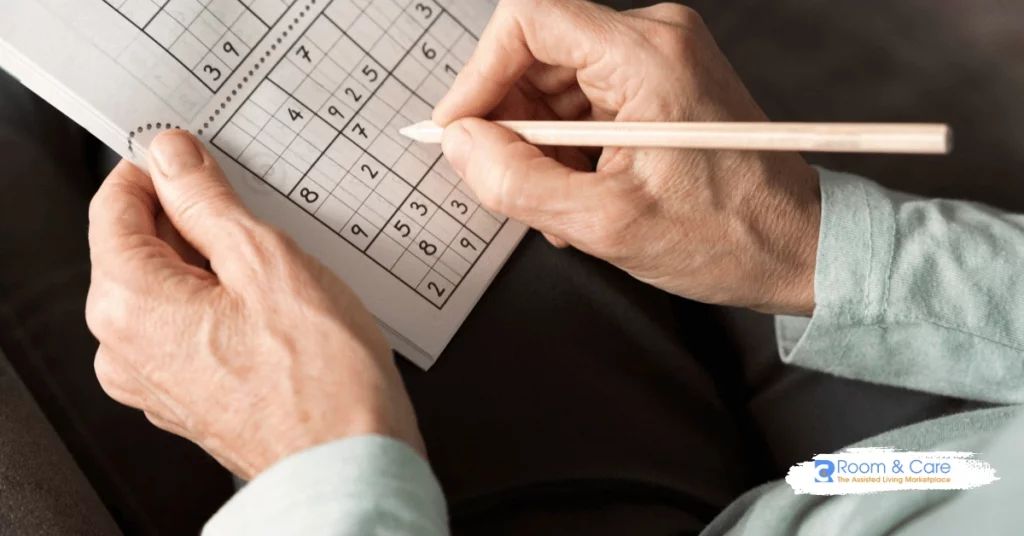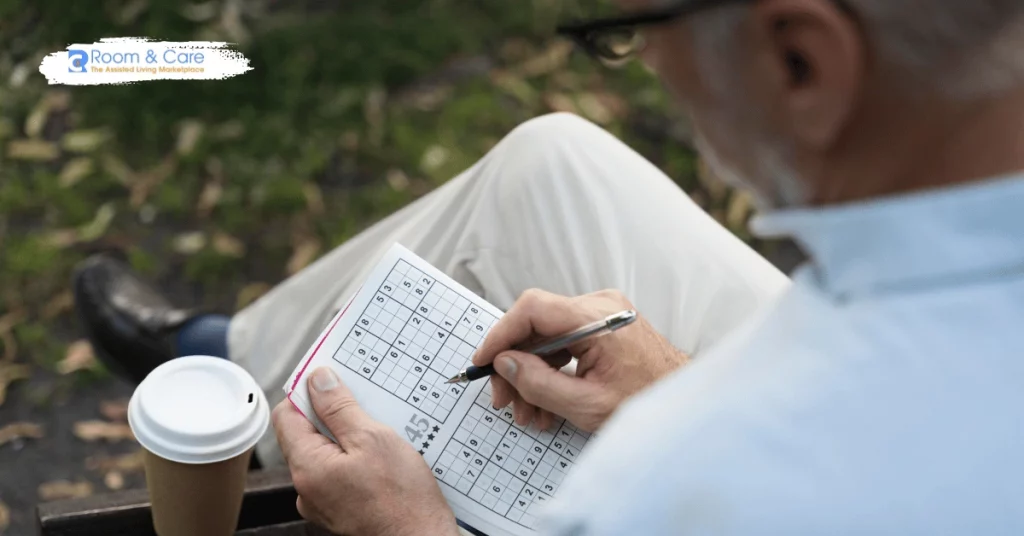

Sudoku isn’t just a game of numbers; it’s a fantastic way for seniors to keep their minds sharp and active. Whether in the comfort of their own homes, an adult family home, or an assisted living facility, sudoku offers unique mental benefits that can positively impact cognitive health. The brain needs regular exercise to stay sharp, and sudoku provides a stimulating challenge for seniors to enjoy while strengthening their mental agility. This article explores how sudoku can boost cognitive health, its potential role in assisted living settings, and why it might be the perfect activity to include in your daily routine.
Sudoku is more than a numbers game; it’s a workout for the brain. As seniors complete each puzzle, they engage in critical thinking, memory recall, and logical analysis, which are essential for maintaining cognitive health. Each puzzle presents a unique challenge that stimulates different areas of the brain, helping to improve:
Studies show that seniors who engage in regular brain exercises, like sudoku, experience slower cognitive decline and maintain their mental sharpness longer than those who do not.
The brain, like any muscle, needs regular exercise to stay healthy. Engaging in mentally stimulating activities like sudoku can help reduce the risk of dementia and Alzheimer’s disease. While no game or activity can fully prevent cognitive decline, regularly playing sudoku can help to delay its onset by keeping neural pathways active.
Research suggests that seniors who participate in mentally engaging activities show better memory retention and slower mental aging. For residents in assisted living communities or adult family homes, these puzzles can be an excellent daily or weekly activity to promote cognitive health in a structured, supportive environment.
Assisted living facilities and adult family homes are increasingly focusing on providing mental and social enrichment activities for their residents. Sudoku is a fantastic choice for these settings because it’s adaptable, accessible, and offers both personal and social benefits.
Flexible Difficulty Levels: Sudoku puzzles are available in various levels, allowing beginners and advanced players alike to participate. Caregivers can tailor puzzle difficulty based on each resident’s abilities, ensuring a positive and achievable experience.
Individual and Group Play: Sudoku can be a solitary activity, perfect for those who prefer quiet, personal reflection. It can also be a group activity, where residents work together to solve puzzles, fostering social interaction and teamwork.
Minimal Requirements: Sudoku doesn’t need extensive equipment—just a puzzle sheet and a pencil. This simplicity makes it perfect for seniors who may have limited mobility or prefer minimal setup.
Structure and Routine: Establishing a daily sudoku time can add structure to the day, giving residents a stimulating and rewarding activity to look forward to.
For seniors in assisted living, social engagement is as essential as mental engagement. Group sudoku activities create a sense of community and collaboration, making it easy for residents to build connections. Assisted living facilities can organize weekly sudoku challenges, encouraging residents to team up and work together to solve more challenging puzzles.

Selecting an assisted living community or adult family home that values cognitive health can significantly enhance a senior’s quality of life. When evaluating facilities, consider the following aspects to ensure your loved one will have access to mentally enriching activities like sudoku.
Look for facilities that prioritize mental wellness through structured activity programs. Many high-quality facilities integrate brain games, logic puzzles, and mental activities like sudoku into their daily or weekly schedules, reflecting their commitment to fostering cognitive health.
A well-rounded assisted living community offers a variety of activities, from puzzles like sudoku to physical exercise programs, art classes, and social events. This diversity of options ensures that residents can explore different interests, keeping both their minds and bodies active.
For seniors who may require extra assistance, such as those with mild dementia, having trained staff on hand is essential. Look for facilities with staff who are experienced in guiding seniors through cognitive activities and who can tailor activities like sudoku based on individual needs.
If your loved one is facing memory-related challenges, a facility that offers specialized memory care can provide additional support. These facilities often incorporate mentally engaging activities, including simplified sudoku puzzles and memory games, to stimulate cognitive function and slow down memory loss.
Choosing the right facility can significantly impact mental wellness and quality of life. Facilities like those offered by Room and Care, which provide access to a variety of assisted living options and adult family homes, offer support to families in finding communities dedicated to cognitive health without referral fees or added costs.
Sudoku can be intimidating at first, especially for those unfamiliar with number puzzles. Here are some practical tips to make it easier for seniors to get started:
Begin with Easy Puzzles: Choose beginner-level puzzles to get comfortable with the rules and logic of the game. Many newspapers or online sudoku platforms offer puzzles with different levels of difficulty.
Set Aside Quiet Time: Completing a sudoku puzzle requires focus, so find a quiet space and set aside a specific time for it. Some seniors may find early morning or late afternoon to be ideal.
Use Pencils and Erasers: Mistakes are part of the learning process. Starting with a pencil and eraser allows seniors to try different numbers without the pressure of making it perfect the first time.
Work with a Partner: For those in assisted living, working with a partner or a small group can make sudoku even more enjoyable. Solving puzzles together encourages teamwork and can create a sense of shared accomplishment.
Celebrate Small Wins: Completing even a simple puzzle can boost confidence and motivation. Celebrate each small success to encourage further practice.
These steps make sudoku an enjoyable and low-pressure activity, promoting both mental and emotional well-being.

Is sudoku suitable for seniors with mild cognitive impairments?
Yes, sudoku can be adapted for seniors with mild cognitive impairments. Simplified puzzles are available, and caregivers can offer assistance to ensure that residents still gain the cognitive benefits without feeling overwhelmed.
Can sudoku really improve memory?
Research supports the cognitive benefits of sudoku. By regularly exercising memory and logic skills, seniors can strengthen their memory pathways and improve recall over time. However, consistency is key—occasional practice is less effective than making sudoku a regular activity.
How can assisted living facilities incorporate sudoku into daily routines?
Many assisted living facilities incorporate sudoku through structured activity sessions, either as a part of group activities or as a personal option in recreational spaces. Facilities can also offer printed puzzles in community areas, allowing residents to complete them at their own pace.
Room and Care simplifies the search for adult family homes, assisted living facilities, memory care communities, and independent living options by connecting families directly to quality care providers. Through Room and Care, families can find communities that prioritize cognitive health, offering engaging activities like sudoku as part of their programs to support seniors’ mental well-being.
Sudoku isn’t just a pastime; it’s a powerful tool for cognitive health. For seniors, regularly engaging in sudoku can enhance memory, improve focus, and offer a rewarding sense of accomplishment. In assisted living and adult family home settings, sudoku can also promote social interaction and provide a structured activity that supports mental resilience.
As you or your loved ones consider ways to stay mentally active, consider the lasting benefits sudoku can bring. This simple game may provide a mental boost that enhances overall well-being, fostering a sharper mind and a more engaged lifestyle. For families seeking the right environment for cognitive health support, Room and Care is an excellent resource to explore care options that provide mentally enriching activities, ensuring seniors can enjoy a high quality of life while staying mentally sharp.